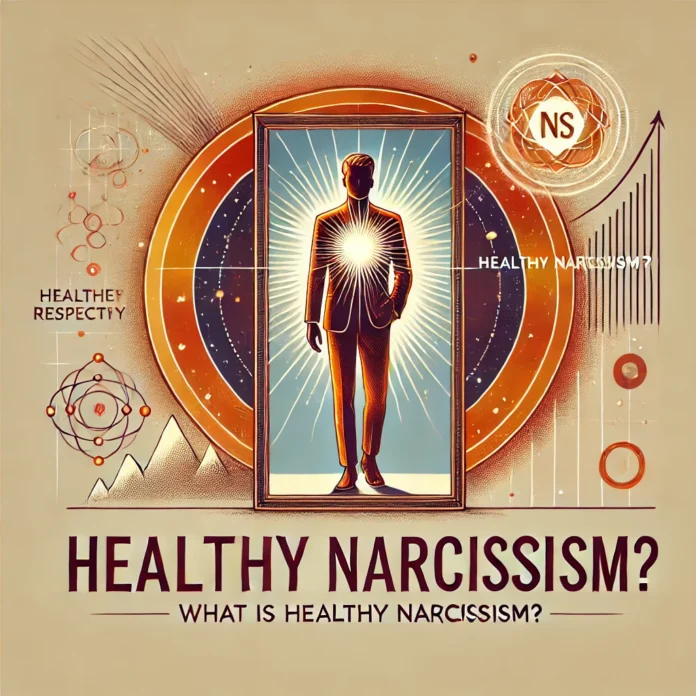Introduction
When people hear the word “narcissism,” they often associate it with arrogance, selfishness, and emotional manipulation. While extreme narcissistic traits can be harmful, not all narcissism is negative. In fact, there is a form of narcissism that is not only healthy but essential for personal growth and success.
This positive form, known as healthy narcissism, plays a crucial role in building self-esteem, confidence, and resilience. Unlike pathological narcissism, which is rooted in insecurity and a need for control, healthy narcissism is about maintaining a strong sense of self-worth while respecting others.
In this article, we will explore what healthy narcissism is, how it differs from unhealthy narcissism, its benefits, and how to develop it in daily life.
Table of Contents
1. Understanding Narcissism: The Spectrum
Narcissism exists on a spectrum, ranging from destructive narcissism to healthy narcissism. While extreme narcissists may lack empathy and manipulate others for personal gain, a moderate level of narcissism is necessary for self-confidence, leadership, and success.
Psychologists describe narcissism as a personality trait that, when balanced, allows people to:
✔️ Feel confident in their abilities.
✔️ Set and achieve goals.
✔️ Establish strong personal boundaries.
✔️ Overcome challenges without losing self-worth.
This balance is what defines healthy narcissism, a trait that can lead to personal and professional fulfillment.
2. What is Healthy Narcissism?
Definition of Healthy Narcissism
Healthy narcissism refers to a positive sense of self that helps individuals feel good about themselves without seeking constant validation from others. It enables people to take pride in their accomplishments while remaining humble and empathetic.
Characteristics of Healthy Narcissism
| Characteristic | Description |
|---|---|
| Genuine self-esteem | A stable and realistic sense of self-worth. |
| Confidence without arrogance | Believing in oneself while respecting others. |
| Emotional resilience | The ability to handle criticism and setbacks. |
| Ambition and motivation | Setting and achieving personal and professional goals. |
| Healthy boundaries | Knowing when to say no and protecting personal well-being. |
Unlike toxic narcissism, which is driven by insecurity and control, healthy narcissism is based on self-acceptance and respect for others.
3. Healthy Narcissism vs. Pathological Narcissism
Key Differences
| Aspect | Healthy Narcissism | Pathological Narcissism |
|---|---|---|
| Self-esteem | Stable and realistic | Fragile and dependent on external validation |
| Confidence | Balanced with humility | Overconfident and dismissive of others |
| Response to criticism | Accepts feedback and grows | Reacts with anger or defensiveness |
| Empathy | Respects and values others | Lacks empathy and exploits people |
| Boundaries | Maintains healthy personal limits | Manipulates and disregards others’ boundaries |
Signs of Healthy Narcissism
✔️ You believe in yourself without feeling superior to others.
✔️ You can accept constructive criticism and use it for growth.
✔️ You feel motivated to achieve success without exploiting others.
✔️ You maintain healthy relationships by setting clear boundaries.
✔️ You take pride in accomplishments without seeking constant praise.
Signs of Unhealthy Narcissism
❌ Constant need for admiration and validation.
❌ Reacting negatively to criticism or rejection.
❌ Exploiting others for personal gain.
❌ Feeling entitled to special treatment.
❌ Lack of empathy for others’ feelings.
Recognizing these differences is essential for cultivating a healthy balance of self-esteem and self-awareness.
4. The Psychological Benefits of Healthy Narcissism
Developing healthy narcissism offers significant psychological and social benefits.
a) Boosts Self-Confidence
- Helps people take risks and seize opportunities.
- Encourages individuals to trust their abilities without self-doubt.
b) Enhances Leadership Skills
- Great leaders exude confidence without arrogance.
- They inspire others while maintaining strong boundaries.
c) Improves Mental Resilience
- Reduces fear of failure and promotes persistence.
- Helps individuals bounce back from criticism without emotional distress.
d) Encourages Healthy Boundaries
- Prevents exploitation in personal and professional relationships.
- Supports mental well-being by reducing toxic interactions.
People with healthy narcissism are more likely to succeed in their careers, maintain fulfilling relationships, and achieve personal happiness.
5. How to Develop Healthy Narcissism
a) Cultivate Self-Respect Without Arrogance
- Recognize your strengths and celebrate achievements.
- Avoid excessive self-criticism or seeking approval from others.
b) Balance Self-Confidence with Humility
- Stay open to feedback and embrace personal growth.
- Recognize that others also have valuable contributions.
c) Set and Maintain Healthy Boundaries
- Learn to say no when necessary.
- Surround yourself with people who respect your space and choices.
d) Foster Emotional Intelligence
- Develop self-awareness and regulate emotions.
- Show empathy while maintaining self-respect.
Practicing these habits can strengthen self-worth while maintaining positive relationships.
6. Misconceptions About Healthy Narcissism
Many people misunderstand healthy narcissism, assuming all forms of narcissism are toxic.
| Myth | Reality |
|---|---|
| All narcissism is bad. | Healthy narcissism is essential for self-confidence. |
| Self-love means arrogance. | You can love yourself while being humble. |
| Narcissists can’t have empathy. | Healthy narcissists respect and value others. |
| Confidence and self-importance are harmful. | Confidence helps people achieve success. |
Understanding the difference between self-respect and arrogance helps people embrace healthy narcissism without guilt.
Conclusion
Healthy narcissism is an essential trait that promotes self-confidence, personal growth, and mental resilience. Unlike pathological narcissism, which is destructive, healthy narcissism empowers individuals to achieve success while maintaining empathy and respect for others.
By embracing self-worth, setting boundaries, and developing emotional intelligence, people can cultivate healthy narcissism and lead more fulfilling lives.

